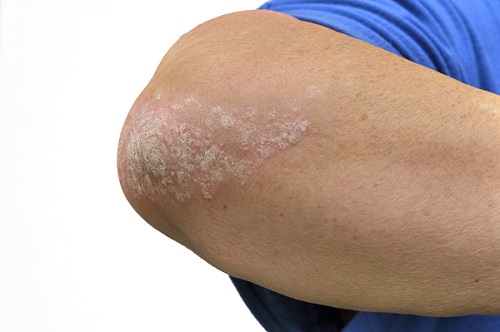
October 29th is designated as 'World Psoriasis Day' by the International Federation of Psoriasis Associations (IFPA).
Psoriasis is a chronic condition that necessitates long-term treatment, yet it remains poorly understood, surrounded by misconceptions. In light of World Psoriasis Day, let's debunk some common misconceptions about psoriasis.
■ Is Psoriasis Contagious? (X)
No, psoriasis is not contagious. While psoriasis is a chronic condition characterized by recurring symptoms, it is not contagious. Its exact cause has not been conclusively determined, but it is believed to be an autoimmune disease resulting from a compromised immune system.
In this condition, immune cells in the skin become hyperactive, leading to the overproduction of immune substances that stimulate skin cells, causing excessive proliferation of skin cells and inflammation. Genetic factors, environmental factors, medications, skin irritants, dryness, upper respiratory infections, psychological stress, among others, can all contribute to its onset and exacerbation.
■ Is It Difficult to Distinguish from Other Skin Conditions? (X)
Psoriasis is characterized by the buildup of thick, scaly skin layers that appear whitish or reddish. While it may be mistaken for conditions like eczema or atopic dermatitis due to these symptoms, psoriasis differs significantly. Psoriasis presents with thick scales layered over clearly defined red patches, distinguishing it from these other skin conditions.
Dr. Kim Jeong-eun, a professor of dermatology at Hanyang University Hospital, explains, "Atopic dermatitis is often the first condition that comes to mind, but unlike atopic dermatitis, psoriasis is less itchy. It tends to develop not in areas with folds, such as the arms or wrists, but rather on protruding areas like the elbows and fronts of the knees." Psoriasis can also appear on various parts of the body, including the scalp, genitals, nails, and buttocks.
■ Does It Mainly Affect Young Patients? (O)
While psoriasis can be diagnosed in individuals in their late 50s, it predominantly occurs in individuals aged 16 to 20. However, it is also prevalent in the age group of 20 to 50, which encompasses active and socially engaged adults. According to statistics from the Health Insurance Review and Assessment Service in 2021, individuals in their 20s to 50s accounted for over 70% of psoriasis patients.
■ Are Treatment Methods Different for Each Patient? (O)
Treatment approaches vary depending on the severity of symptoms.
“In the early stages with mild symptoms, treatment typically involves applying topical steroids and ointments containing vitamin D. As symptoms worsen, phototherapy using ultraviolet radiation with specific wavelengths or systemic immune suppressants may be recommended,” Professor Young-Bok Lee said.
If these treatments are not sufficiently effective or if side effects occur, biologic therapies are considered. Biologic therapies are the most recent and diverse category of treatment options, with several available medications. The choice of biologic therapy is determined based on factors such as the patient's comorbidities, underlying conditions, and concurrent medications. Most biologic therapies are administered by injection.
■ Can Psoriasis Be Cured with Continuous Treatment? (△)
While continuous treatment can lead to significant symptom improvement, psoriasis is a condition with a high risk of recurrence. Therefore, it is crucial to maintain long-term management in consultation with a primary care physician, rather than discontinuing treatment.
Professor Baek Jin-ok of Gachon University Gil Hospital's Department of Dermatology emphasizes, "Irregular eating habits, sleep deprivation, stress, and other factors can disrupt the immune system, increasing the risk of psoriasis onset." She advises individuals to be mindful of the potential for symptom exacerbation, even after the visible symptoms have disappeared, and to prioritize skincare to keep the skin consistently moisturized.
■ Should Even the Smallest Wound Be Avoided? (O)
In psoriasis, a phenomenon known as the Köbner phenomenon can occur, where psoriasis develops at the site of even minor skin injuries. It is important not to forcibly remove the white, raised scales. Instead, it is essential to regularly apply moisturizers to keep the skin consistently hydrated. If itching is frequent, it is advisable not to scratch with the hands but rather to use a cold compress and seek appropriate treatment as needed."


